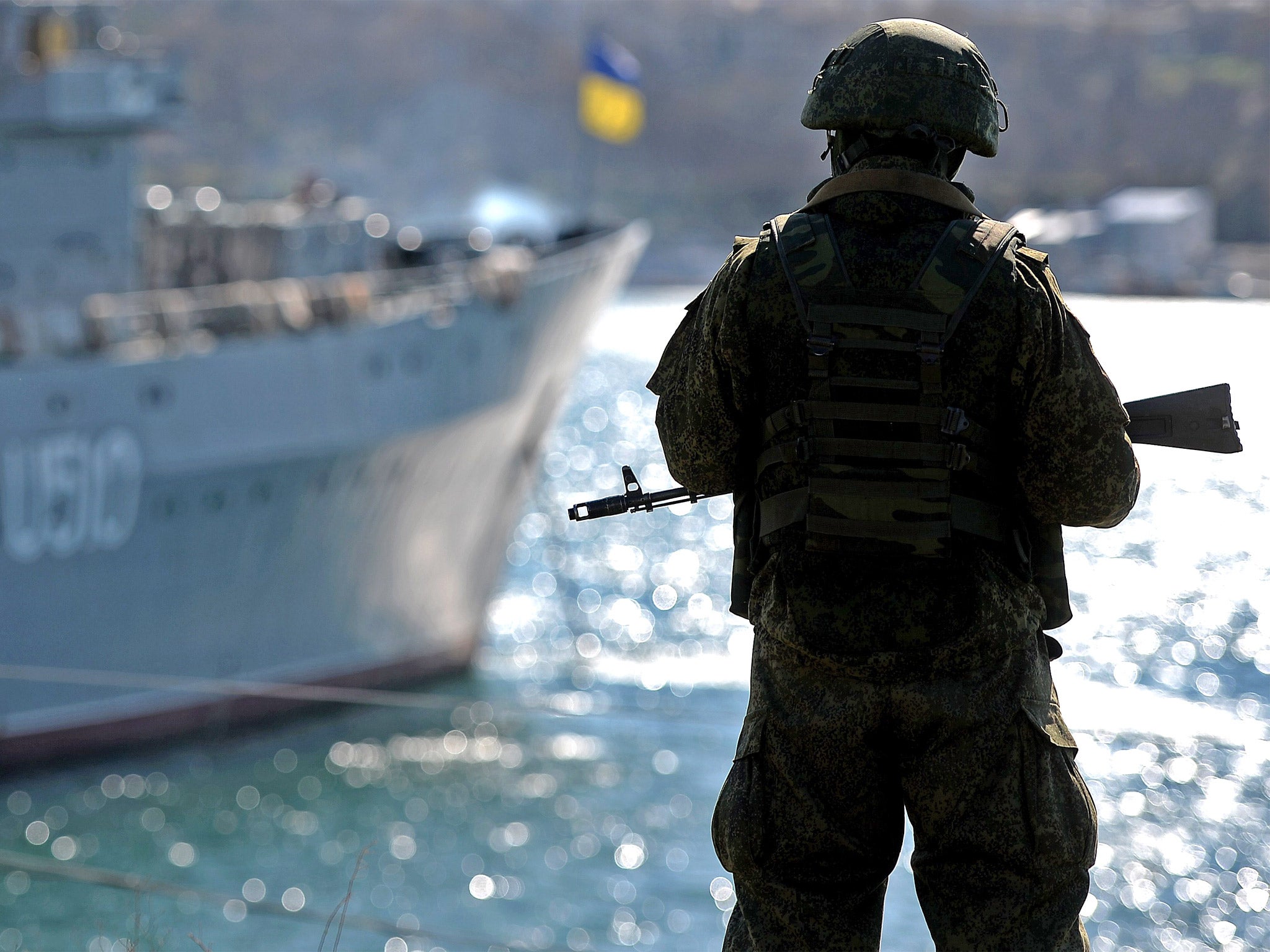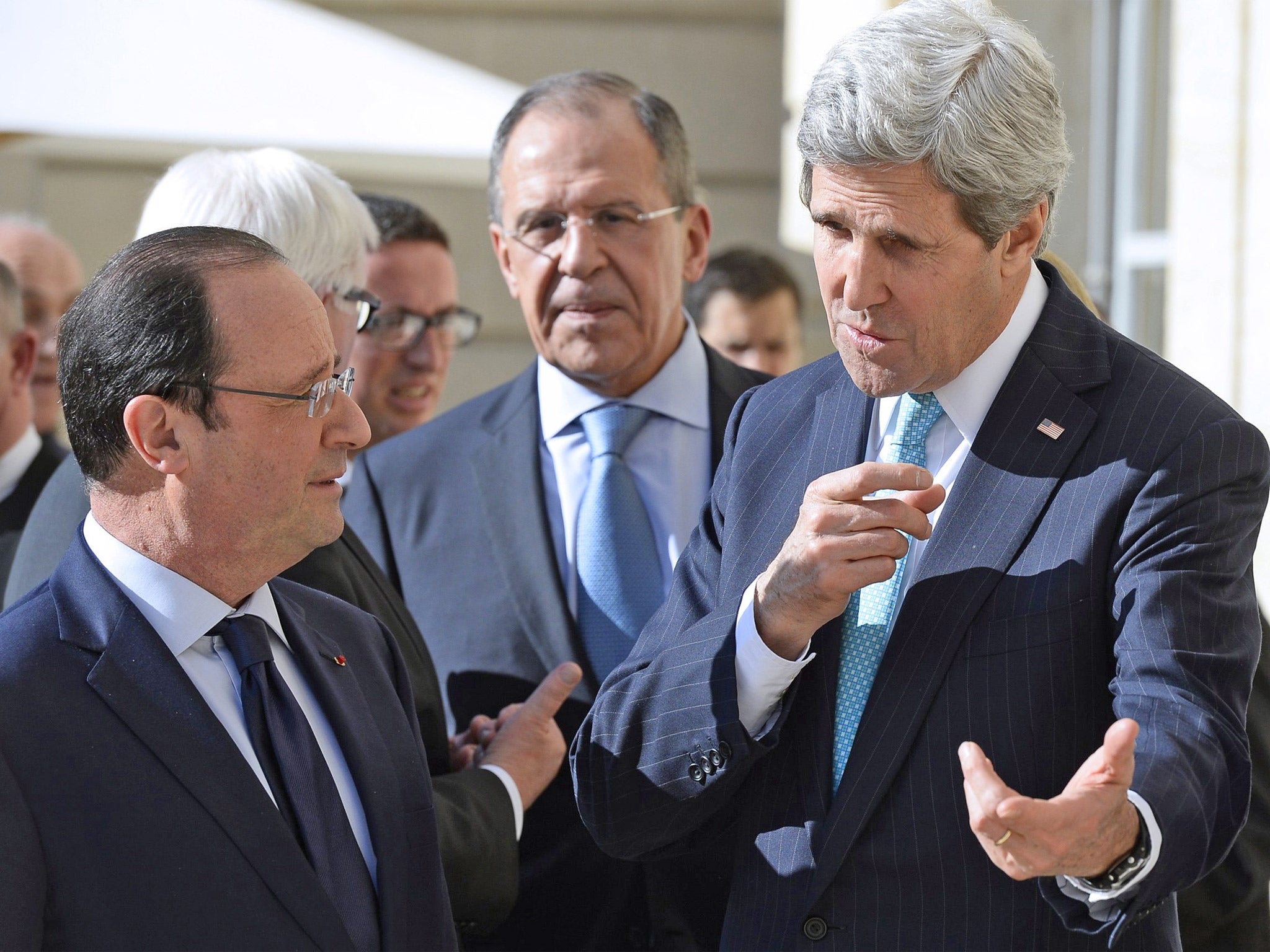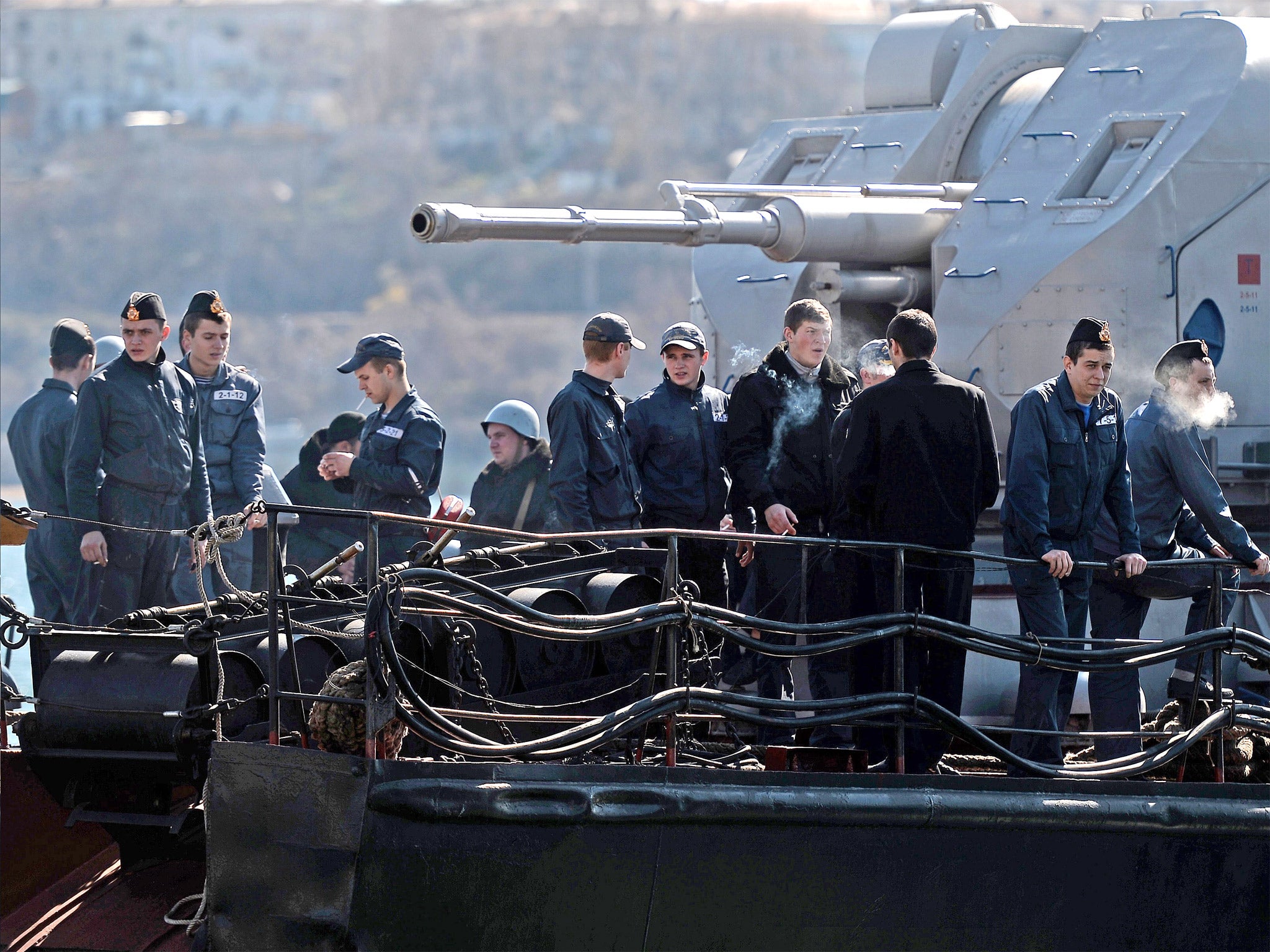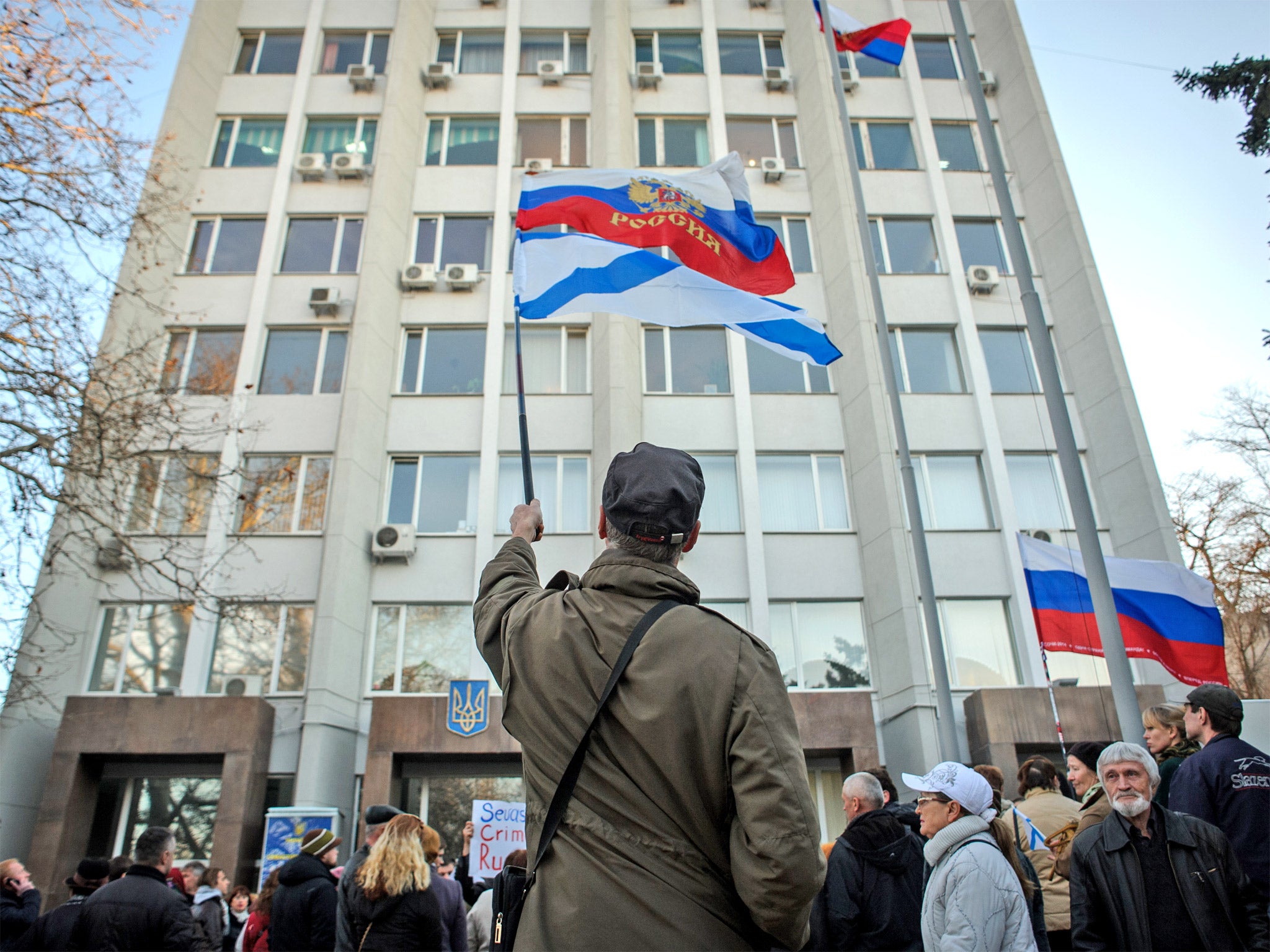Ukraine crisis: Urgent talks, angry words, but there's still no coherent plan to end Crimea’s stand-off
Sergei Lavrov, Russia’s Foreign Minister, spurns the opportunity to meet his Ukrainian counterpart face to face

Your support helps us to tell the story
From reproductive rights to climate change to Big Tech, The Independent is on the ground when the story is developing. Whether it's investigating the financials of Elon Musk's pro-Trump PAC or producing our latest documentary, 'The A Word', which shines a light on the American women fighting for reproductive rights, we know how important it is to parse out the facts from the messaging.
At such a critical moment in US history, we need reporters on the ground. Your donation allows us to keep sending journalists to speak to both sides of the story.
The Independent is trusted by Americans across the entire political spectrum. And unlike many other quality news outlets, we choose not to lock Americans out of our reporting and analysis with paywalls. We believe quality journalism should be available to everyone, paid for by those who can afford it.
Your support makes all the difference.The US State Department has slammed the Russian President for ‘spinning fiction’ over the crisis in Ukraine, accusing him of producing ten false claims in a fact sheet released on Wednesday.
In a document entitled 'President Putin's Fiction: 10 False Claims about Ukraine', the Department said President Vladimir Putin has distorted or ignored facts in "justifying Russian aggression in the Ukraine."
The document read: "As Russia spins a false narrative to justify its illegal actions in Ukraine, the world has not seen such startling Russian fiction since Dostoyevsky wrote: 'The formula "two plus two equals five" is not without its attractions.'"
Meanwhile, Russia has rebuffed Western efforts to engineer a diplomatic solution to the Ukraine crisis by refusing to enter direct talks with the new Kiev authorities in Paris.
The Russian Foreign Minister Sergei Lavrov had earlier also refused a meeting with his Ukrainian counterpart in the wings of a conference in the Elysée Palace. He had, however, shown some willingness to enter "contact" talks with Ukrainian officials, possibly through intermediaries.
French, British and German foreign ministers had hoped that a direct meeting between Mr Lavrov and Andriy Deshchytsia, Ukraine's Foreign Minister, would signal a willingness by Moscow to scale down the confrontation in Crimea and eastern Ukraine.
The US Secretary of State John Kerry said he had held "zero expectation" that the two parties would speak directly. He said the "intense discussions" would continue towards a "de-escalation" of the crisis. "Russia made a choice. And we have clearly stated that we believe it is the wrong choice to move troops into Crimea. Russia can now make the right choice," Mr Kerry said. "We cannot and will not allow the integrity and sovereignty of the country of Ukraine to be violated."
French officials said that Mr Lavrov had refused to recognise Mr Deshchytsia's legitimacy as a representative of the Ukrainian people - sticking to Moscow's line that the change of government in Kiev last month was an "illegal" coup.
Earlier, Mr Lavrov had also rejected Western calls for Russian forces within the Ukrainian province of Crimea to end their blockade of Ukrainian military bases. He denied that troops ringing the bases were Russian, saying they were local Russian-speaking "self-defence forces".

A French official at the conference, originally convened to discuss Syrian refugees, said that the Russian approach was "not helping" to break the impasse. "They deny that they have invaded Crimea and they do not recognise the interim Ukrainian government," the official said.
Nato said it was suspending contacts with Russia, including planning for a joint mission on Syrian chemical weapons. The Nato Secretary-General, Anders Fogh Rasmussen, said officials would be stepping up engagement with Ukraine's civilian and military leadership. "We have also decided that no staff-level civilian or military meetings with Russia will take place for now," he said.
The talks had been intended to lay the groundwork for an emergency summit of EU heads of state in Brussels on Thursday. EU leaders will try to agree a package of political and economic sanctions against Russia which would take effect if Moscow fails to ease its stranglehold on Ukrainian military bases in the Crimea.
Officials warned, however, of deep fissures between EU governments, with the German Chancellor Angela Merkel reluctant to commit herself to economic punishment of Moscow which might rebound against European economies.
The EU has offered a €15bn (£12bn) aid package to Ukraine. Brussels also announced plans to freeze the assets in European banks of 18 Ukrainian politicians and business leaders who are suspected of stealing billions in state funds. David Cameron will meet Chancellor Merkel and the French President François Hollande ahead of today's European summit. It will also be attended by Arseniy Yatsenyuk, Ukraine's Prime Minister.
Amid signs of strains between EU members over how to tackle the crisis, Mr Cameron told MPs that it was important the meeting showed "unity of purpose". He added: "When we look at the diplomatic, economic and political steps we can take, nothing should be off the table."

British sources said Chancellor Merkel was cautious over taking action because of Germany's reliance on gas imports from Russia. One government source said: "Unless we act together, Putin could just shrug his shoulders."
The French Foreign Minister, Laurent Fabius, said that Paris and Berlin had put forward "building blocks" for a possible diplomatic solution. This would involve a return to the agreement negotiated by EU foreign ministers - with broad Russian approval - on 21 February. There should, Mr Fabius said, be a "government of union" in Kiev and the dissolution of the extreme nationalist, right-wing militias which have allowed Moscow to paint the Ukrainian insurrection as "fascist".
In return, Russian forces within Crimea would cease to block Ukrainian military facilities. "The 2004 constitution [giving guarantees to Russian speakers and other linguistic minorities] would apply," Mr Fabius said. "We would move towards a presidential election."

The Foreign Secretary William Hague said a key demand was for Russia's military to pull back to its Black Sea bases to show its willingness to de-escalate the crisis.
Earlier in Madrid, Mr Lavrov said, when asked whether Moscow would order forces in Crimea back to their bases: "If you mean the self-defence units created by the inhabitants of Crimea, they take no orders from us. As for the military personnel of the Black Sea Fleet, they are in their deployment sites. We will do everything not to allow any bloodshed."
Mr Hague and Mr Kerry had earlier met the Ukrainian Foreign Minister in Paris to discuss the "Budapest memorandum" of 1994, in which the US, Britain and Russian jointly guarantee Ukraine's sovereignty. Mr Lavrov refused to attend that meeting.
"Ukraine voluntarily surrendered the world's third-largest nuclear weapons arsenal in exchange for these assurances," Mr Hague and Mr Kerry said in a joint statement. "The three governments treat these assurances with utmost seriousness, and expect Russia to [do so] as well. Russia has chosen to act unilaterally and militarily. The UK and US will continue to support Ukraine's sovereignty and we commend the new Ukrainian government for not taking actions that might escalate the situation."
Officials said the last point referred to repeated Western advice to Kiev to avoid any military action which would give Moscow an excuse to tighten its grip on Crimea or invade eastern Ukraine.
Mr Deshchytsia said: "We want to keep neighbourly relations with the Russian people. We want to settle this peacefully."
On the flight to Paris, he saidUkraine was not willing to go to war to prevent Russia from annexing Crimea but said he did not think military action would be necessary. He said Moscow would back down rather than suffer economic penalties and diplomatic isolation.
Join our commenting forum
Join thought-provoking conversations, follow other Independent readers and see their replies
Comments